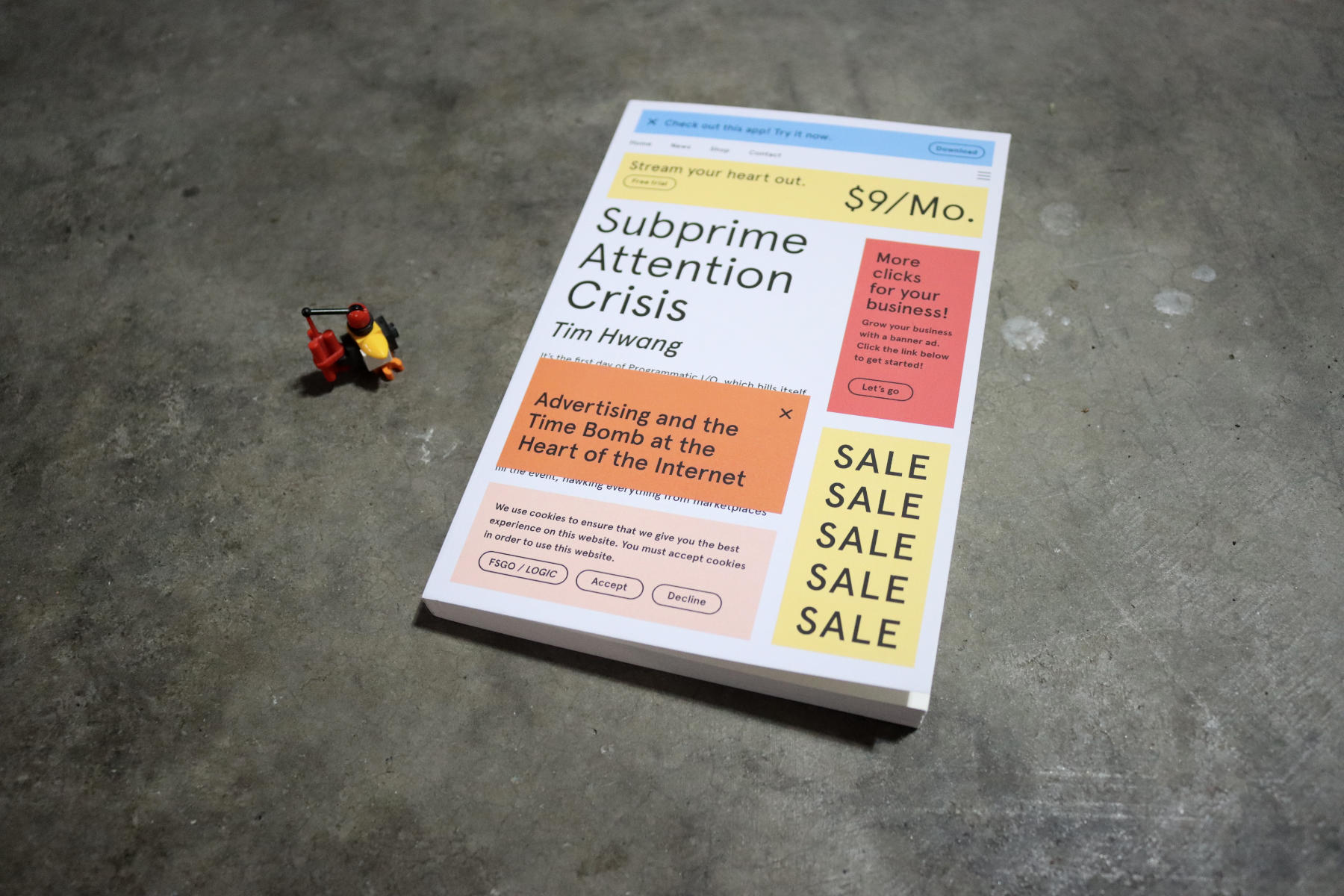If you've ever wanted to look at how the online ad industry was shaped, and how it shapes the internet we get today then Subprime Attention Crisis by Tim Hwang is the book you've been waiting for. Hwang's purpose is to investigate the ties between how online advertising is structured and how it connects to financial markets1. He wants to show us that the footing of the internet is built on a much shakier foundation than we assume.
The Internet Plumbing
To finance much of what we use online, publishers sell the attention of their readers or watches via Real Time Bidding platforms2. I first said that if you aren't paying you are the product back in 2012.
The purchase of ads assumes that attention of the end prospect is being purchased. This is how Google finances search, and all it's other products. Selling the attention of the captured user. Hwang contends, that ads perform far worse than ad purchasers are lead to believe, and thus they pay for more than they ever should for these ads.
Components of the Ad Bubble
Unlike billboards you can in theory measure the affects of online advertising through tracking user behaviours3. Despite this reduction in some of the opacity of the industry, the online ad industry has many areas that remain opaque and help head toward a market that can collapse.
First, algorithmic trading is so big and fast that no one understands how it all works4. You can find no person who can give a definitive answer about why one ad was sold at what price where over some other ad.
Second there are dark markets that drive up prices5. These are markets given to specific purchases of ad inventory that are not available to everyone. It limits the players in the market and drives up pricing across the market.
Third, we have new intermediaries in Facebook and Google6. They control the markets and thus can do mostly whatever they want because ad purchases need the attention. We see the result of this in the Facebook video fiasco where they said video was performing well and then publications invested in video to the detriment of the written word. Later we found out that Facebook inflated their video numbers and ended up crushing businesses when they said video didn't matter as much anymore and business was left with video staffs and nothing to do.
Finally, the online ad market is a flywheel of investment. As more attention goes online it gets riskier to purchase ads that you can't measure7. This leads to decreased revenue for traditional ads, thus they start to shut down.
Exploding the Bubble
For online advertising to continue to work it relies on the invasion of the privacy of users, which is referred to as surveillance capitalism8. Currently more and more users are noticing this trade off and are increasingly unsure if the services provided for all their information are worth the trade. At the same time we see companies grabbing for more attention in ways that increase radicalization and polarization9, which isn't good for society in any fashion.
The current monetization strategies also limit the types of products we get10. If you can't collect personal information to sell, then you can't monetize in the ways that have proven to be highly lucrative in the web industry. The demand for products that don't collect your information increases as people decide that the trade isn't worth it.
The big danger with popping the ad bubble is that it will deprive people of many resources they use daily. Gmail is around because Google can pay for it with ads, if ads stop being the profit center they are then millions would have to start paying for email or not have it.
Instead Hwang suggests a new government agency that rigorously studies the impact that ads have from both sides11. Do ad buyers get the attention they think they're purchasing? Is the information of users traded fairly for the services they're receiving? This is a US centric solution, but with most of the ad space online being run by US companies, it's one that would have far raging effects. Not living in the US it does make me hesitate though, would every country have to have a similar agency to make this work or would we have "better" rules for the US while the rest of the world is exploited?
Should You Read Subprime Attention Crisis by Tim Hwang
While I found this book interesting, I'm not sure it's a must read for all but the few that are heavily interested in the online ad space or how the internet is financed. There are no action steps provided to individuals that are going to affect the outcome, unless you happen to be in charge of a country and can start a new agency to deal with ads.
If you've read a bunch about surveillance capitalism and want another look at it with the ad market and it's attention bubble as a focus, this is a decent short read. Otherwise, there are likely other books that will serve you better.
Purchase Subprime Attention Crisis: Independent Bookstore | Amazon
